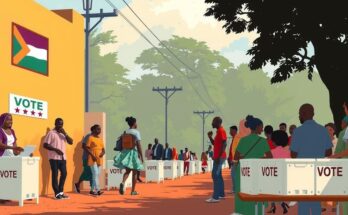Ecuador is set for a presidential runoff between Daniel Noboa and Luisa González after neither candidate secured an outright win in the first round. Concerns over rising crime, particularly related to drug trafficking, dominate voter priorities. With both candidates garnering close percentages, this election is crucial in shaping future policies aimed at reducing violence and improving security in the nation.
Ecuador’s upcoming presidential election will proceed to a runoff in April, featuring conservative incumbent Daniel Noboa and leftist lawyer Luisa González. Voter concerns are predominantly focused on crime, driven by cocaine trafficking from neighboring Colombia and Peru, leading to alarming rates of homicide, kidnapping, and extortion. The National Electoral Council reported that with 92.1% of ballots counted, Noboa garnered 44.31% while González received 43.83%, overshadowing the other 14 candidates.
Despite neither candidate winning outright in the initial round, they both significantly outpaced their competitors. Both are now competing for a complete four-year term, promising to tackle Ecuador’s rampant crime issues, which have profoundly affected citizens over recent years. Noboa’s presidency has seen a slight decrease in homicide rates, yet they remain elevated compared to previous years, with other violent crimes on the rise.
Voter sentiment is influenced by personal experiences with crime. Tales of necessity to pay local gangs for protection resonate deeply among citizens, with some expressing skepticism about Noboa’s ability to effect meaningful change. González is viewed more favorably by those seeking a shift in policy toward crime reduction and economic improvement.
Ecuador mandates voting, with over 83% of eligible voters participating in this election. Noboa, a businessman and politician, has employed controversial tactics to address crime during his term, sparking dialogue about their legality and effectiveness. Meanwhile, González’s affiliation with former President Rafael Correa’s legacy positions her as a formidable challenger amid the evolving political landscape.
Political analysts suggest Noboa must adapt his campaign strategy as he faces criticisms regarding his handling of corruption and crime. Voter sentiment indicates a lack of faith in any candidate to significantly lower crime rates, with individuals highlighting deep-rooted governmental corruption as an impediment to change. As the runoff approaches, it remains to be seen whether voter fatigue with crime can be transformed into a path forward for Ecuador’s troubled governance.
The Ecuadorian presidential runoff will see incumbent Daniel Noboa challenge Luisa González as voter dissatisfaction with crime continues to affect public opinion. With significant percentages of the vote, both candidates emphasize addressing the country’s security crisis. Amid various pressures, Noboa’s tactics have garnered mixed reviews, while González seeks to present an alternative approach. The outcome of this election could significantly impact Ecuador’s future direction in governance and public safety.
Original Source: www.foxnews.com




